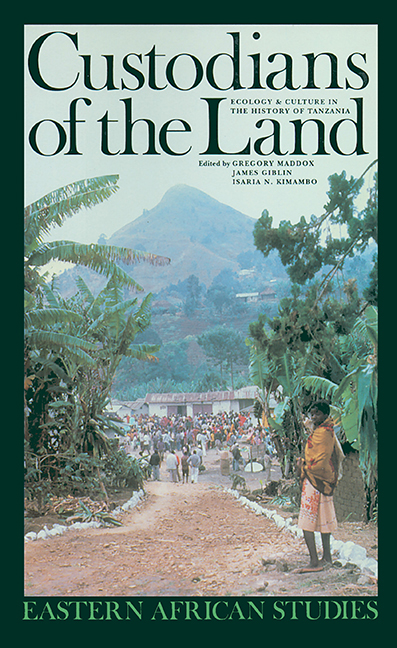Book contents
- Frontmatter
- Contents
- List of Maps, Figures & Tables
- List of Photographs
- Abbreviations
- Contributors
- Acknowledgements
- Introduction Custodians of the Land: Ecology & Culture in the History of Tanzania
- Part One Environmental & Demographic Change
- Part Two Environmental Change & Economic History: In Tanzania's Northern Highlands
- Part Three Politics & Environmental Change
- Five The Precolonial Politics of Disease Control: In the Lowlands of Northeastern Tanzania
- Six ‘We Don't Want Terraces!’: Protest & Identity under the Uluguru Land Usage Scheme
- Part Four Environment & Morality
- Conclusion
- Bibliography
- Index
Six - ‘We Don't Want Terraces!’: Protest & Identity under the Uluguru Land Usage Scheme
from Part Three - Politics & Environmental Change
Published online by Cambridge University Press: 30 August 2017
- Frontmatter
- Contents
- List of Maps, Figures & Tables
- List of Photographs
- Abbreviations
- Contributors
- Acknowledgements
- Introduction Custodians of the Land: Ecology & Culture in the History of Tanzania
- Part One Environmental & Demographic Change
- Part Two Environmental Change & Economic History: In Tanzania's Northern Highlands
- Part Three Politics & Environmental Change
- Five The Precolonial Politics of Disease Control: In the Lowlands of Northeastern Tanzania
- Six ‘We Don't Want Terraces!’: Protest & Identity under the Uluguru Land Usage Scheme
- Part Four Environment & Morality
- Conclusion
- Bibliography
- Index
Summary
In 1955, an estimated 4000 inhabitants of the Uluguru Mountains of Morogoro District in Tanzania, the Waluguru, began hurling insults, sticks and stones at their native authority chief and British rulers. The riot began at a meeting called by colonial officials in the Matombo sub-area on the eastern side of the mountains to discuss the growing resentment of the Waluguru with soil conservation measures introduced in 1947. In the fracas which ensued an African demonstrator, John Mahenge, was shot and bled to death while an angry company of colonial police sought to control an even angrier body of Waluguru. As the Waluguru chanted in Kiswahili, ‘We don't want terraces, give us back our old ways/ they were protesting against a way of life in which increased hard work did not bring increased rewards. The riots represent the cry of a people struggling to deal with colonial policies which were based on erroneous assumptions about Waluguru land ownership patterns and labour practices. These assumptions threatened internal power relations within Morogoro while reminding the Waluguru that in the last analysis power lay with the colonial government. Moreover, these soil conservation measures strained not only social relations but also the already fragile soils in the mountain, thus posing a serious threat to the livelihood of the people. For a time, therefore, the Waluguru found their disparate interests united in their struggle against a common enemy: the colonial government.
During the Depression of the 1930s and the Second World War, concern with soil conditions was subsumed by the perceived need to increase production. But, following the war, colonial officials who were creating the ‘new colonialism’ of the postwar period became overwhelmingly concerned with the problem of soil erosion in Tanzania. Colonial officials instigated five regional development schemes in Mbulu, Usukuma, Kondoa, Usambara and Uluguru in the late 1940s. The purpose of these schemes was to address stagnation in agricultural production at local levels. In practice, all five schemes sought increased production in the long term through various soil conservation methods. Because these schemes required a great deal of African labour, their success was dependent on African cooperation. Initially, officials believed Africans would willingly contribute to ‘help themselves'. In some areas, notably Mbulu and Usukuma, they did 'help themselves’ because they obtained benefits immediately. The remaining three schemes were unquestionably failures.
- Type
- Chapter
- Information
- Custodians of the LandEcology and Culture in the History of Tanzania, pp. 152 - 170Publisher: Boydell & BrewerPrint publication year: 1996

